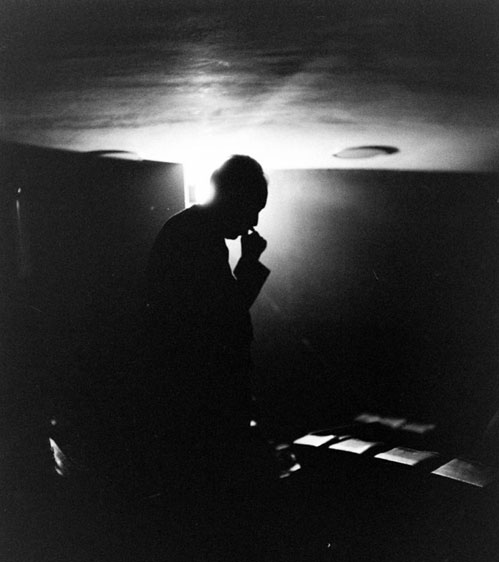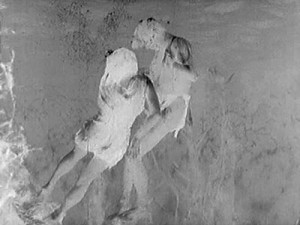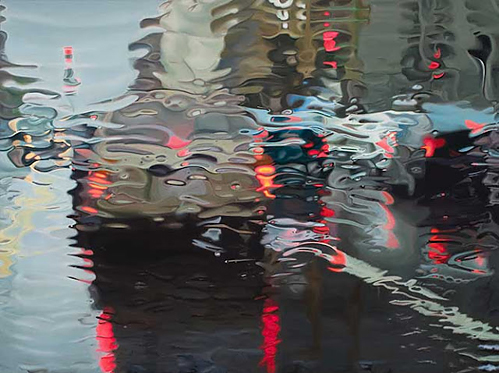Notes on a talk by Michael Stone at Centre of Gravity, Toronto, June 22, 2012
Teacher
Suzuki noticed that things are beautiful because they’re out of balance. What was he like as a teacher? Here’s Mel Weitsman (from interview with D. Chadwick transcript on Crooked Cucumbe website): “He taught by example, but he also taught with words, without saying something directly. That was more his forte. Two things: one is he taught through his body by standing up and sitting down and walking. What we learned from him is how to walk, how to sit down, how to stand up. And he taught with his lectures and speech. And he taught in a casual way – just being with him you wanted to be on your toes. Just by his presence it made you want to be careful. Doing something with him made you attentive so you could harmonize with him. So I always felt like paying a lot of respect – like an apprentice with his teacher. It’s because his teaching wasn’t ”do this and do that” but was in the context of moving around and interaction without any idea of it being teaching. This is what kept you on your toes. The way you moved with him was how he taught.”
Appreciation
Shunryu Suzuki December 16, 1965
“The purpose of my talk is not to give you some intellectual understanding but just to express appreciation of our practice. To sit with you in this way—very unusual. Of course whatever we do in this life should be unusual; it is so unusual anyway. As Buddha said, “To appreciate our human life is as rare as soil on your nail.” You know, soil on your nail is so little. Our human life is so rare, and so wonderful, and when I sit I want to remain in this way forever, but I encourage myself to have another practice, for instance, to recite sutra or to make bow. And when we make bow, I think, “this is wonderful”, but we have to change our practice for reciting sutra. And when I recite sutra I don’t feel to talk after reciting sutra… So the purpose of my talk is to express my appreciation, that’s all. Our way is not to sit for something; it is to express our true nature. That is our practice.”
Isn’t that a wonderful and simple thing? Brown rice practice. Simple. Nothing added. Are we here to gain enlightenment? Are we here to be free? Or are we here to appreciate our lives? Or, is there a difference?
Maybe there was a moment when we were attracted to the idea of enlightenment and maybe this idea meant we were stuck, because we were chasing something. But our practice is not about acquiring anything, only to appreciate our life. Last week we spoke about the practice of forgiveness, and perhaps it boils down to appreciating your life. Why is it so hard to learn this lesson? We say, “How great it is to be alive, and what a precious thing it is just to have life,” we all this is true and nobody disagrees. And yet we never think of it. We rush through our days busy and solving problems or anxious or just confused. We rarely stop to appreciate it and express that appreciation in everything we do. We want to wriggle out of wherever we are.
Problems
Problems arrive from so many directions. We all have bodies, usually we don’t notice our bodies until they parts stop working. But every body is going to fall apart. And then there are relationships, has anyone here tried that lately? We’re part of the natural world – along with tsunamis, mosquitoes, menstrual cramps. This practice is about going deeper than philosophical ideas of appreciation, how do you turn your practice around so that the events of your life, even your problems – are doorways to appreciation? Thank your enemy, your noisy neighbours, thank your heartbroken love refusenik, your overbearing boss. Appreciate them. All the cittas are holy. What did Pattabhi Jois say? “If you get born into a heaven realm it’s bad for your practice – there’s not enough suffering.”
Sincerity Menu
Suzuki: “So if you want to express yourself there should be some natural and appropriate way to express. Even when you sway yourself, right and left, after you sit, is also to express yourself. It is not relaxation or preparation for the practice. It is a part of the practice. So we should not do it as if you are preparing for something. It is part of your practice, not preparation. To cook, to fix some food, is not preparation, according to Dogen’s idea. It is practice. It is the expression of our sincerity. To cook is not to prepare food for someone or for yourself. It is the expression of your sincerity. So when you cook, you should express yourselves in your activity in the kitchen. So you should take plenty of time to do it and you should work on it without expecting something, or without something in your mind. You should just… cook.”
Beginningless
So perhaps your practice today began when you got on your bike to come here. But there was the day that preceded your getting on the bike, and that was part of the practice too. Perhaps your practice began when you got up in the morning? Or when you rolled out of bed for the first time? Perhaps practice began when you were born. Perhaps there is no beginning to practice, after all.
When I was in Japan I wanted to raise the level of my practice. Then the mind comes in and gives that cartoon a caption that reads: discipline. But actually deeper practice means being more relaxed. Everything you do is practice. The way you gesture all day, all that is part of your yoga. How can you hold yourself to a higher level of attentiveness? To deeper levels of forgiveness? To forgive yourself for wanting things to be better?
Preparation
To cook, or to fix some food, is not preparation, according to Dogen, it is practice. To cook is not just to prepare food for someone or for yourself, it is to express your sincerity. There is no preparation for something else. There is no preparation for something else. There is no preparation. When people get sick, if they have an open heart, they start appreciating their life. I might not be here in a year. You stop preparing yourself for another time.
Track
Suzuki: So, Bodhisattva’s way is called ‘single-minded way’ or ‘one railway track thousand miles… thousands of miles… one railway track thousands of miles, we say, one railway track. The railway track is always, you know, the same. If the railway track became wider, or narrower, it may be awful. Wherever you go the railway track is always the same. That is Bodhisattva’s way. So even though the sun were to rise from west, the Boddhisattva’s way is only one. There is no other way. To express his nature, his sincerity, is his way. And there’s no other way. But, we say ‘railway track’, but actually there’s no railway track. The sincerity is the railway track. And the sight you see from the train will be different, but we are running always on same track. This is Boddhisattva’s way. And there’s… for the track there’s no beginning or no end.
Beginningless and endless track. This is Bodhisattva’s way; and this is the nature of our zen practice. So there is no beginning, or no attainment, no starting point or no goal…no attainment….nothing to attain. Our purpose is just to run on the track is our way. But when you become curious about what is zen, what is railway track, danger is there. You should not see the railway track. If you see it you will become dizzy. You should appreciate the sight you will have on your train. That is our way. There’s no need to be curious about the railway track….for the passenger. Someone will take care of it. Buddha will take care of it. But sometime we have to explain what is railway track, because we are so curious… we become so curious if something is always same. “How is it possible for him to be always same, like that? What is the secret?” But there’s no secret. Everyone has same nature as railway track. This is our way of practice. So it is necessary to sit in this way. But just to sit is not our way. Whatever you do, it should be the same activity.”
Suzuki’s track is also the central axis of the body. When you can keep your mind out of your central axis, when you can stop exercising your preferences, which shrink the big sky of your life, which act to separate you from what is happening right now, then you have beginner’s mind.
Philosophy
Perhaps the track began at the beginning of your life, maybe it started last night. It doesn’t matter. Those are philosophical questions that can be shelved, unnecessary for practice. Distractions even. Careful about the track. Suzuki is saying: you can’t understand your life. How did I get here tonight? Have you ever looked into the mirror and wondered: how did I get this face? What happened to this face? Maybe Suzuki’s saying that we’re so busy getting distracted, perhaps asking ‘what is the meaning of life’ is the wrong question. Instead we might ask: How to arrive here? Don’t worry about the track.
While I was in Japan I met a monk who was also a potter. He asked me where I was from and said he’d never been there, though he’d spent a couple of moments in Wisconsin. He assured me, “You know, the future of Buddhism is in the west, but not the spirit.” I asked him, “What’s the spirit?” He said, “Humility.”
Here is how Suzuki concludes his talk. He relates an old story. It goes like this. “There were good….two good friends, Chokai and Shi Fu Ku. They started some talk about the Boddhisattva’s way and Chokai said, “If the Arahat were to have evil desires, the Boddhisattva has no two ways.” Shi Fu Ku said, “Even though you say so, your comment is not perfect.” Chokai said, “What is your interpretation… what is the actual Boddhisattva’s way?” Shi Fu Ku said, “Now I found out that you did not understand Boddhisattva’s way.” Chokai said, “What is your understanding of Boddhisattva’s way?” Shi Fu Ku said, “We have had enough discussion. So let’s have a cup of tea.”
They are good friends you know. Let’s have a cup of tea. He didn’t give any answer to him. It is impossible, you now, to give some interpretation to our way, but as a part of practice, they discuss something… they try to discuss, but they didn’t want to find out something new, so, “Our discussion is over, let’s have a cup of tea.” That’s very good isn’t it? So, I should say, “I am hungry enough to have breakfast, so let’s have some breakfast… my practice is over… I mean your listening is over.” That is our way. There’s no problem, and there’s no need to remember what I say. There’s no need for you to understand what I say. You understood. You have full understanding in… within yourself. But something must go on the track. We have to have some passengers. If we have railway track we have to have train… so, train track for dining room.”
Sauerkraut
Emotions always speak about conditions of the moment, and our habit patterns. When you have turbulent emotions let’s practice and stay with them. Could we go on a diet of sensation? Imagine a diet of renunciation, for the first week no salt. Second week we’ll remove spices. We won’t add anything extra. Perhaps we could extend this eating practice to our minds. To feel new sensations of your sadness without adding anything extra. Sprouted, vegan, fermented feelings. A sauerkraut of emotions. How do you get closer? How can we practice so that we can be closer to our sensations and our emotions, without covering them with our usual story tellings?
When you become more intimate with the way things are they appear less personal. When there’s more distance, events become more personal. Don’t wrap your head around it, you’re just having tea.
Patanjali writes about abiding in one’s true nature. This is the central axis, it’s hollow, and also you have patterns. If you try to look at the rails you fall off. What’s all this riding on? This self form? It doesn’t matter, that’s just another idea, another occasion to spin storytelling and continue to live inside abstractions.
Can you open to what you’re feeling and see what’s under all that and then show me, base your livelihood, your career, make your art out of that place? Otherwise we’re just expressing old habits. To have the experience of awe, and then to go past that, to express it, to work it.
If instead you’re wondering about where you’re getting to, when your teaching training will be done, if you’re separating the preparation from the thing itself, if you’re putting the important guests in one room and the lower functionaries in the other, the preludes from the main symphonies… In Tibet they call this a wish fulfilling tree. It’s when practice adds crystals to the chandelier of the your ego. Instead of crystals, Suzuki is saying: I’m just teaching you to stand up and sit down. And at the same time, no one can really tell you about these things. You already have everything you need.
Here’s a riff from Suzuki that didn’t make it into Zen Mind, Beginner’s Mind. “To be quite natural… to ourselves, and to follow what others say or what others do in the most appropriate way is pretty difficult… but we cannot adjust ourselves, in some way. It is impossible. If you try to adjust yourself in certain way you will lose yourself. So without adjust yourself, without any artificial, fancy way of adjusting yourself, to express yourself quite freely is the most important thing to make you happy and to make others happy.”
“Hell, if you understood everything I said, you’d be me.” (Miles Davis, Newsweek, March 23, 1970)





